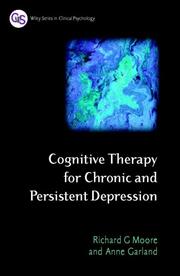-
Zusatztext
-
Which depressed patients are the best candidates for cognitive therapy? Who should receive medication alone and who might benefit from combination treatments? Is there the need to adapt classical cognitive therapy approaches to meet the needs of patients with more severe or more persistent depressive disorders? This unique book tackles these crucial questions by looking specifically at the needs of this patient population. The book covers three key areas. Firstly, a comprehensive and extensive review of the prevalent definitions, concepts and causes of chronic depression is presented. The core of the text offers a coherent overview of cognitive conceptualisations of chronic depression and the appropriate adaptations of cognitive behavioural approaches to this population. The third section will deal with three related topics - service delivery; research outcome data; and a summary of therapy approaches, the need for training and future issues. * A comprehensive and coherent overview of cognitive conceptualisations of chronic depression * Describes the author's therapy approach, with supporting outcome and research evidence * Discusses the needs for training, supervision and support for therapists working with these difficult to treat patients
-
-
Kurztext
-
"This volume provides the most comprehensive presentation, to date, of the phenomenology, clinical aspects and cognitive therapy of persistent depression. The text is highly readable, replete with illustrative case material and highlighted by concise summaries at the end of each chapter. The treatment approach, already validated in the famed Cambridge-Newcastle clinical trial, is an invaluable contribution." --Aaron T. Beck, M.D. Drawing on extensive clinical experience, Richard G. Moore and Anne Garland present a cognitive model of persistent depression that places particular importance on the role of thinking styles, underlying beliefs, subtle forms of avoidance and environmental factors. For the practitioner, this book offers guidance on how to address particular issues that commonly arise at each stage of therapy, such as: * the patient is reluctant to engage in therapy * the patient's negative thinking does not respond to standard therapeutic techniques * the patient's negative beliefs have much basis in their experience * the therapist becomes demor alised by the apparent lack of progress in therapy Through extensive clinical material, Cognitive Therapy for Chronic and Persistent Depression demonstrates how entrenched negative thinking patterns and ongoing avoidance can be addressed to achieve significant change in many people's lives. This book is essential reading for any therapist working with these hard to help patients, such as clinical psychologists, psychiatric nurses, psychiatrists, social workers and counsellors.
-
-
Autorenportrait
- Richard Moore works as a clinical psychologist in the Department of Cognitive and Behavioural Psychotherapies at Addenbrooke's Hospital in Cambridge. After obtaining an M.A. and a PhD. from the University of Cambridge and completing his clinical psychology training at the University of Edinburgh, he trained as a cognitive therapist at the Center for Cognitive Therapy in Philadelphia. He has been a therapist on major controlled trials of cognitive therapy for recurrent and residual depression in Edinburgh and in Cambridge. He is a Founding Fellow of the Academy of Cognitive Therapy. Anne Garland is a nurse consultant in psychological therapies at the Nottingham Psychotherapy Unit. After training in cognitive therapy at Sheffield and Oxford, Anne worked as a therapist in two Medical Research Council funded trails investigating the efficacy of using cognitive therapy in the treatment of residual depression and bi-polar disorder. She has developed clinical expertise in the delivery of cognitive therapy across NHS service settings including primary care, community mental health teams, inpatient units and specialist psychotherapy services. She is currently President-elect to the British Association of Behavioural and Cognitive Psychotherapies (BABCP) as a member of the psychotherapy accreditation sub-committee.
Detailansicht
Cognitive Therapy for Chronic and Persistent Depression
Wiley Series in Clinical Psychology
ISBN/EAN: 9780471892786
Umbreit-Nr.: 2083172
Sprache:
Englisch
Umfang: 436 S.
Format in cm:
Einband:
gebundenes Buch
Erschienen am 19.08.2003
Auflage: 1/2003


